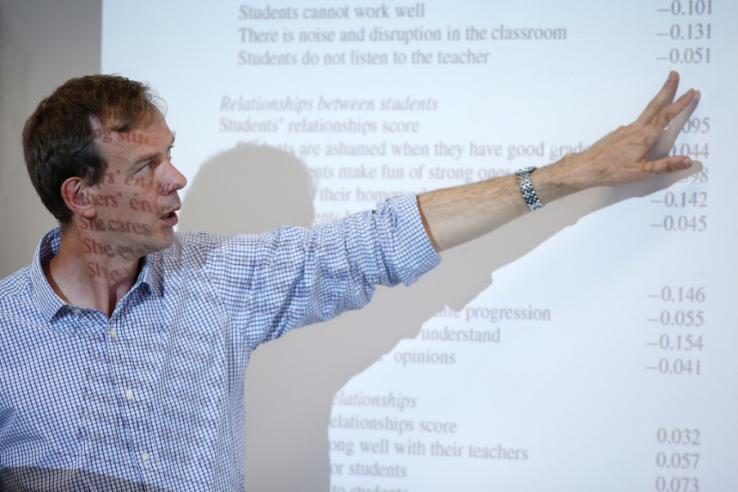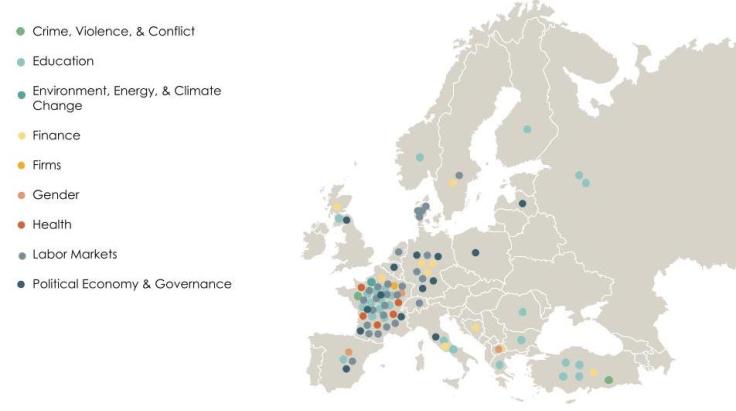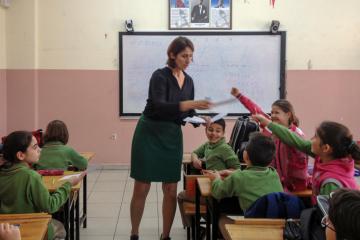
J-PAL at 20: Reflecting on two decades of promoting evidence for impact in Europe

From two full-time staff to an expanding team of roughly thirty people, J-PAL Europe has seen significant growth since its founding in 2008. Hosted at the Paris School of Economics, J-PAL Europe’s early work focused primarily on supporting research in France. Notable examples of the network’s early work in France include evaluating the effectiveness of interventions designed to promote the engagement of parents in their children’s education, piloting job search counselling and job placement programmes for youth, and examining the effects of anonymised CVs on hiring discrimination.
In the years since, J-PAL Europe’s research portfolio has expanded to cover a broad range of subjects, including education, labour, finance, gender, governance and climate change. In parallel, its work has grown to encompass countries the region over—from Finland to Spain, and Turkey to the UK. Some more recent highlights from the network’s research include:
- Establishing the effectiveness of a low-cost, online tutoring programme in improving the academic performance and wellbeing of students from disadvantaged backgrounds in Italy during Covid-related school closures, which is currently being adapted to new country contexts (such as the Dominican Republic);
- Highlighting the importance of personalised feedback on pollution levels in reducing households’ usage of wood heating in France;
- Establishing the effectiveness of a classroom intervention designed to improve inter-ethnic cohesion in Turkey by encouraging students to understand others’ perspectives (this programme is now being scaled up across Turkish schools);
- Highlighting the effectiveness of cash transfers to mothers in augmenting household expenditure on food and, in accordance, demonstrating recipients’ improved decision-making power within their households in North Macedonia.
Across the continent, researchers in the J-PAL network have conducted over 100 completed or ongoing randomised evaluations of social programmes in 21 European countries. The geographic and sectoral reach of J-PAL’s work in Europe is shown in the graphic below.

The launch of the European Social Inclusion Initiative (ESII) in 2019 introduced the first dedicated pool of research funding for European challenges. ESII aims to develop and disseminate policy lessons for fostering social inclusion in Europe with a focus on migrants and refugees and children, youth, and their families. To date, the initiative has funded eight projects in France, Finland, Germany, Italy, the Netherlands, Sweden and Turkey that have ranged from data-driven approaches to refugee integration to fostering social skills in ethnic diversity through inclusive classroom practices.
Another defining workstream took shape in 2021 with the launch of the Innovation, Data, and Experiments in Education (IDEE) programme, supported by an eight-year grant from the French National Research Agency. IDEE’s mission is to make France a leader in experimental research in education by improving access to administrative data and developing resources to facilitate the generation of experiments designed to inform education policy. We hope that IDEE’s model and findings can contribute to this work internationally.
Looking ahead, J-PAL’s work in Europe is expanding into new contexts and working areas. One highlight is the budding work in Spain. J-PAL Europe has undertaken a partnership with the Spanish Ministry of Inclusion, Social Security, and Migration and the Centro de Estudios Monetarios y Financieros (CEMFI) to launch a Policy Lab focused on making evidence a core component of crafting social policy in Spain. J-PAL Europe is providing technical assistance on the evaluation design of over two dozen randomised evaluations of pilot social inclusion programmes that target beneficiaries of the minimum income scheme and will help the Ministry consider the implications of the findings from this research. Building on this example, J-PAL Europe is working to form new partnerships with other government ministries who are looking to produce rigorous evidence to foster social inclusion and reduce poverty.
Additionally, our Humanitarian Effectiveness Research Initiative is a long-term investment in generating actionable, cross-cutting insights to improve the effectiveness of humanitarian action around the world. In 2023, we will focus in particular on launching new research to support the livelihoods of displaced populations, including those affected by the war in Ukraine.
J-PAL is also building new partnerships with development actors in Europe to help them access and apply findings from rigorous evaluations around the world. Through the establishment of a Development Methodologies Chair in partnership with the French development agency (AFD), we are working to further promote the use of innovative policy evaluation methods and the wide application of research findings in the formation of development policy in France and beyond. This includes a commitment to providing advanced training to researchers in lower and middle-income countries. We have also partnered with the Luxembourg Institute of Socio-Economic Research (LISER) and the Luxembourg Ministry of Foreign and European Affairs to support the integration of more rigorous evidence from randomised evaluations into the programming of national ministries and to launch new evaluations. Lastly, J-PAL Europe will support the German development actor GIZ in piloting a model of evidence coordination to promote the use of rigorous evidence in programme design.
We at J-PAL Europe are grateful for the many partnerships and friendships we have been able to forge to do this work over the past two decades. We continue to welcome the opportunity to start new partnerships focused on designing innovative responses to the complex and diverse challenges facing European countries today. Whether you are interested in partnering to rigorously evaluate new solutions to these challenges or for support in considering the best insights for designing social programmes from existing research, we would welcome the opportunity to start a conversation.


